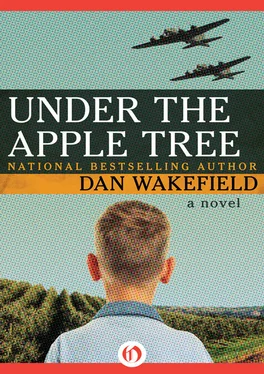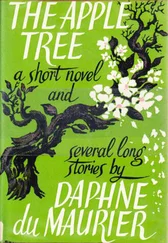Tutlow looked him right in the eyes, and without even blinking he said right off the bat:
Roses are red,
Violets are blue,
Hitler stinks
And so do you!
Artie let out a real hee-haw, and all Ben Vickman could say was, “Aw, your father’s mustache,” which didn’t have anything to do with the price of eggs, and he slunk away.
Tutlow invited Artie to come over to his house after school.
Artie was really impressed to find out that Tutlow not only read the War stuff in the magazines, he clipped it out and pasted it into a scrapbook with a picture of Old Glory on the front.
Tutlow had stuff in his War Scrapbook that even Artie had missed. The most exciting thing of all was an article from Life magazine about this bunch of farmers out in Tillamook, Oregon, who were organized by a blind veteran of World War I to defend their homes and families against enemy attack. There were pictures of the farmers with their guns, crouched behind tree stumps. The article said: “They are prepared to defend their heritage with bullets and frontiersman’s lore. Sworn to die fighting if need be, they plan to hide their dairy herds deep in the woods, to combat forest fires started by incendiary bombs, and to harry the invader who dares penetrate their trackless timberland. To a man, they are dead shots.”
When he finished reading the article, Artie looked at Tutlow and said, “My Dad has a twenty-two rifle he goes hunting with. And I got a BB gun.”
“Well, I got a BB gun,” said Warren, “but I think all my Dad has is a blackjack.”
“A blackjack?” Artie asked, impressed. “How come?”
“He says if anyone ever tried to break in the house and rob us, it’s better to be able to bang him one on the bean than shoot him full of holes. Then, when he’s out cold, you can call the police.”
“That’s really neat,” Artie said. “What’s your Dad do?”
“He’s an Insurance Man. Sells Farm and Life.”
“Wow,” said Artie.
He didn’t know exactly what it meant to sell Farm and Life, but it sounded pretty important. Maybe dangerous, too, if Mr. Tutlow had his own blackjack.
“I bet if you bopped a Jap on the head with a blackjack,” Tutlow said, “you might really kill him instead of just knocking him out, since he’d be so small.”
“Heck, yes,” Artie said. “A blackjack would be a sort of different kind of secret weapon than a rifle or BB gun for killing Jap invaders if they tried to take Birney.”
Tutlow nodded, and both boys vowed to ask their Dads if they could start up an armed group of men like the ones in Tillamook, Oregon, to defend their own town.
Dad was underneath a Studebaker when Artie went over to the station to ask about getting him to help organize a group of armed men to stave off parachute attacks from the Japs or Nazis on Birney, Illinois. All Artie could see was Dad’s legs and feet sticking out from under the car which was really okay, maybe even best, since Artie was kind of afraid his Dad might think the whole thing was weird and give him one of those “Now, son” looks or come out with one of his philosophical sayings like, “You don’t get anything done by running around like a chicken with its head cut off.”
“Who are these fellas with guns?” Dad asked when Artie explained the whole thing.
“Farmers, out in Tillamook, Oregon. They were organized by this blind veteran from World War One.”
“Well, far as I know, we don’t have us any blind veterans from World War One here in Birney.”
“Aw, come on, Dad,” Artie said. “You don’t have to have one of those. It’s even better if the guy in charge isn’t blind, if you ask me. So he can see the parachutes dropping.”
Dad scooted out from under the Studie, stood up, looking at Artie real serious now, as he wiped his greasy hands with the greasy rag.
“Son,” he said, which meant it was going to be serious, “those fellows out in Oregon, they’re right near the Pacific Ocean, where Jap subs are sneaking around, so they have some call to get their guns out and be on the ready, but it’s just not the same for us here right smack in the middle of the country.”
“What about the airplanes? What about Chicago is closer to occupied Norway on the polar route than New York City and we’re right below Chicago?”
“If the wind blows one down here from Chicago, you let me know and I’ll go and grab the twenty-two.”
“Heck,” said Artie, “it’s not the same.”
His Dad fished into his pocket and handed Artie a penny.
“Here, go put this in the peanut machine.”
Artie turned and went in the office part of the station, but he didn’t get peanuts. He would save the darn penny and put it toward a ten-cent War Stamp. He would also figure out a way that he and Warren Tutlow could do more for Civil Defense instead of just waiting around for their Dads to go grab their guns and blackjacks when the enemy was already landing in the Town Square.
Mom came in the house humming, carrying a bag of groceries. She walked in the dining room, screamed, and dropped the bag.
The bodies of Artie and his friend Warren Tutlow were lying face down and motionless under the dining room table.
Artie looked up and asked, “What’s wrong, Mom?”
“What on earth are you doing under there? I thought you were dead.”
“For gosh sakes, we’re practicing,” Artie said.
He and Tutlow crawled out from under the table and started gathering up the spilled groceries.
“This War has poisoned everything if boys have to practice being dead,” Mom said.
“We weren’t dead, ma’am,” Tutlow explained. “We were practicing what to do in an Air Raid.”
“Haven’t you even read the CD Air Raid pamphlet?” Artie asked his mother.
“What pamphlet?”
Artie scrambled up and got the pamphlet, which was lying on top of the table that he and Tutlow had been lying under.
“It says the safest place in an Air Raid is at home,” Artie said, scanning the pamphlet. “You should go to the center of the house and lie down under ‘a good stout table.’ That’s what we were doing.”
“Well, you gave me a scare.”
“You should know this stuff too, Mom,” Artie said, and proceeded to read from the pamphlet. “‘You most likely won’t be hit or trapped, but if you are, you can depend on rescue squads to go after you.’ You’re supposed to remember to ‘answer tapping from rescue crews.’”
“Just don’t go around tapping when I’m not expecting it, please,” Mom said.
“Also, you’re supposed to stay away from windows, Mom. You should know this stuff.”
“I know enough to duck if the bombs start dropping. I don’t have to read a pamphlet.”
“Listen to this,” Artie said, and read from the pamphlet again: “‘You can lick the Japs with your bare hands if you will just do these simple things …’”
“‘With your bare hands’!” Mom shouted. “Let me see that thing.”
She took the pamphlet from Artie and looked at it, shaking her head, then starting to nod, like she’d found a part she agreed with.
“I hope you remember this part, boys,” she said, holding up a finger while she read: “‘Do not be a wise guy and get hurt.’”
“Aw, Mom,” Artie moaned.
“It says so right here in the pamphlet,” she said, and took the groceries to the kitchen.
The change in Roy when he came back from Moline after enlisting was small potatoes compared to the way he had changed when he got back from Boot Camp for his furlough before being shipped overseas.
Now he wore the uniform of the United States Marines. Artie used to think that nothing in the world was more big-time and glorious than the uniform of the Birney Bearcats, which only went to show how wet behind the ears he had been before the War. The gold and black uniform of the Birney football and basketball teams was only kid stuff compared to the forest green of the United States Marines.
Читать дальше












